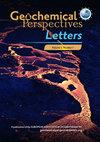Fe2S和Fe12S7对125 GPa的稳定性对富含s的行星核心的影响
IF 3.7
1区 地球科学
Q1 GEOCHEMISTRY & GEOPHYSICS
引用次数: 2
摘要
在激光加热的金刚石砧座电池中,使用单晶X射线衍射,在22–25 wt.%S的组成范围内探索了Fe-FeS的相关系。在高达125GPa的压力和高温下,Fe2S和Fe12S7被确定为共结晶。新的Fe12S7化合物采用Co12P7结构,Fe2S呈现Fe2P型结构。将这些结果应用于Fe-FeS二元相图,揭示了在16–25 wt.%S范围内的一系列复杂的FeS相组合,其中S含量的微小变化显著影响富Fe-S行星核心的结晶顺序。对于富含S的Fe 2 S-Fe 12 S 7共晶堆芯成分,固体Fe 12 S和Fe 2 S之间的小密度差异可能导致堆芯泥的形成,而不是重力稳定的内堆芯。在共晶条件下,密度更大的Fe2S的结晶可能会导致富含Fe2S的内芯随着时间的推移而重力沉降。由于先前已确定在低至22GPa的高温压力下形成Fe2P型Fe2S,因此本文确定的堆芯结晶状态也阐明了火星堆芯硫成分必须位于Fe-Fe3S共晶的富S侧,甚至位于Fe3S-Fe2S共晶富S侧以保持完全熔融的堆芯。本文章由计算机程序翻译,如有差异,请以英文原文为准。
Stability of Fe2S and Fe12S7 to 125 GPa; implications for S-rich planetary cores
The Fe-FeS phase relations were explored in the 22 – 25 wt. % S compositional range using single crystal X-ray diffraction in a laser heated diamond anvil cell. At pressures up to 125 GPa and at high temperatures, Fe 2 S and Fe 12 S 7 were determined to co-crystallise. The novel Fe 12 S 7 compound adopts the Co 12 P 7 structure and Fe 2 S assumes the Fe 2 P-type structure. Applying these results to an Fe-FeS binary phase diagram exposes a complex series of FeS phase assemblages in the 16 – 25 wt. % S range, whereby minor changes in S content significantly affect the crystallisation sequence of Fe-S rich planetary cores. For core compositions S-rich of the Fe 2 S-Fe 12 S 7 eutectic, the small density difference between solid Fe 12 S 7 and Fe 2 S is likely to result in the formation of a core slush rather than a gravitationally stable inner core. Crystallisation of denser Fe 2 S at eutectic conditions could then result in gravitational settling of an Fe 2 S-rich inner core over time. As the Fe 2 P-type Fe 2 S has previously been identified forming at high temperatures to pressures as low as 22 GPa, the core crystallisation regimes determined here also elucidate that the Martian core sulfur composition must lie on the S-rich side of the Fe-Fe 3 S eutectic or even the S-rich side of the Fe 3 S-Fe 2 S eutectic to maintain a fully molten core.
求助全文
通过发布文献求助,成功后即可免费获取论文全文。
去求助
来源期刊

Geochemical Perspectives Letters
Earth and Planetary Sciences-Geochemistry and Petrology
CiteScore
7.00
自引率
2.00%
发文量
42
审稿时长
15 weeks
期刊介绍:
Geochemical Perspectives Letters is an open access, internationally peer-reviewed journal of the European Association of Geochemistry (EAG) that publishes short, highest-quality articles spanning geochemical sciences. The journal aims at rapid publication of the most novel research in geochemistry with a focus on outstanding quality, international importance, originality, and stimulating new developments across the vast array of geochemical disciplines.
 求助内容:
求助内容: 应助结果提醒方式:
应助结果提醒方式:


